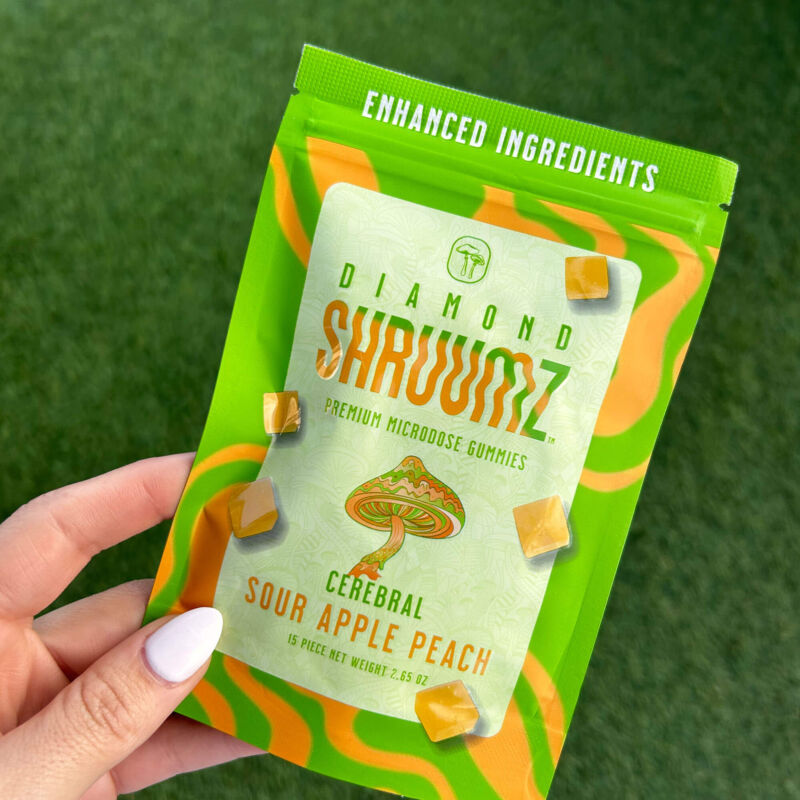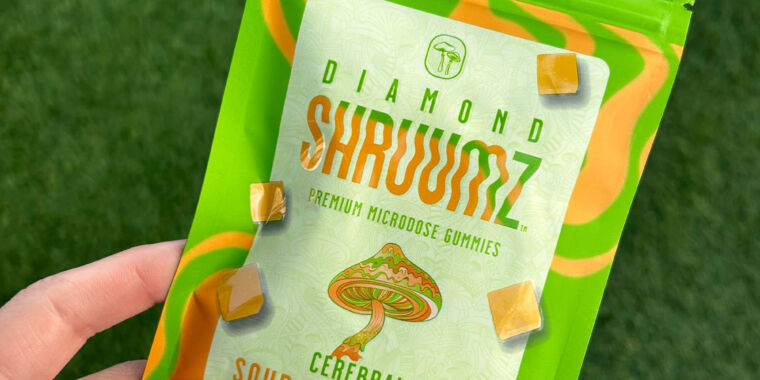
Newly released test data from Diamond Shruumz brand gummies purchased in 2023 has revealed the presence of psilocin, a hallucinogenic drug closely related to the magic mushroom drug psilocybin, which is classified as a Schedule I drug along with psilocybin, heroin, and LSD.
The finding comes as Diamond Shruumz’s current line of gummies, chocolates and candy cones is being recalled and actively investigated in connection with a nationwide spate of serious illnesses that have included seizures, intubation and intensive care. As of the last update on July 15, 69 people in 28 states have become ill after eating a Diamond Shruumz product. Sixty of the 69 sought medical attention, 36 were hospitalized, and one possible associated death is under investigation.
The new discovery of psilocin in the products, published by researchers at the University of Virginia, adds to growing concerns about psychedelic mushroom candies in general. Although the candies are marketed as legal, they often contain a variety of undisclosed illegal drugs, synthetic versions of gray market drugs, and dangerous adulterants and contaminants.
In the ongoing investigation into Diamond Shruumz candy, led by the Food and Drug Administration and the Centers for Disease Control and Prevention, with help from America’s Poison Centers and state and local partners, researchers have not identified psilocin in the products linked to the illnesses. Instead, they have found a closely related synthetic hallucinogenic compound called 4-acetoxy-N,N-dimethyltryptamine, also known as psilacetin or 4-AcO-DMT. It is thought that psilocin is converted to psilocin in the body and has effects similar to taking magic mushrooms or psilocybin. The different test results between the FDA-led investigation and the new UVA study could be due to possible changes in the formulation between 2023 and 2024 or simply differences in the products or batches of candy tested to date.
The UVA researchers, who published their findings in the CDC's Morbidity and Mortality Weekly Report, looked into the mushroom candies after four adults reported illnesses to a local poison control center between September and November 2023. The people went to the emergency room with tachycardia, confusion, anxiety or drowsiness, and nausea after eating gummy candies labeled Fly agaric mushrooms. During their investigation into those cases, a 3-year-old also became ill in June 2024 after accidentally eating two gummies marketed as containing A. muscariaAll adults and the toddler recovered quickly from their illnesses, although the toddler was admitted to the hospital for one day for observation.
Not legal or safe
A. muscaria is a legal hallucinogenic mushroom that contains psychoactive compounds ibotenic acid and muscimol. These resemble neurotransmitters in the brain and can cause gastrointestinal symptoms, agitation, and seizures.
The UVA researchers were unable to determine the specific brands or products the sick adults were taking, but they collected six similar products from nearby gas stations and smoke shops. Those six products included two Diamond Shruumz products, which were not marketed as containing A kind of muscaria. Using liquid chromatography-mass spectrometry, researchers found that the two Diamond Shruumz gummy products (Sour Peach Apple and Rainbow flavors) contained psilocin. The Rainbow flavor also contained caffeine.
Additionally, a product labeled “Wonderland Legal Psychedelics Cherry Nirvana” contained psilocin, the synthetic hallucinogen N,N-dimethyltryptamine, a compound found in kratom called mitragynine, and caffeine. A product labeled “Urb Magic Amanita Mushroom Watermelon” contained psilocybin, psilocin, and the stimulant 2-phenethylamine. A product called “Psilly’s Legal Psychedelic Mushrooms Fruit Punch” contained the stimulant ephedrine, and a product called “Tryp mushroom gummies” was found to contain no compounds of concern.
The UVA study could not test for ibotenic acid or muscimol. In the Diamond Shruumz recall notice, the company said it found higher than normal levels of muscimol in its products. FDA testing has not identified muscimol in product testing, according to results released so far.
“People tend to equate ‘legal’ with ‘safe,’ which isn’t necessarily the case. These products are unregulated and could contain any number of unlabeled substances that, when consumed, could cause adverse symptoms,” UVA study lead author Avery Michienzi said in a statement. “Some packaging has QR codes that show the products are lab-tested and contain only what is listed on the label. These have been shown to be incorrect.”
The FDA warned this week that while all Diamond Shruumz products have been recalled, they are still on store shelves across the country. The agency said it is reaching out to industry partners to raise awareness about the recall and monitor the effectiveness of Diamond Shruumz recalls.

